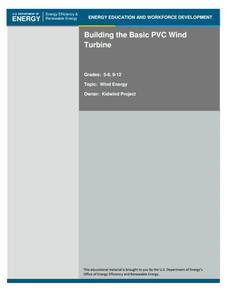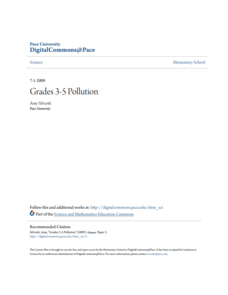Redefining Progress
Have and Have-Not
Is there a correlation between a country's wealth and the extent of its ecological footprint? What exactly constitutes an ecological footprint, and how does one country stack up against the rest? This is a unique lesson to incorporate...
PricewaterhouseCoopers
Waste and Recycling: Recycling and Energy Recovery
Reduce, reuse, recycle, and recover. Young environmentalists learn about the overwhelming amount of garbage produced and discover better ways to minimize their impact on Earth by learning the difference between garbage and recyclables.
Curated OER
“THE LORAX” by Dr. Seuss
Few children's books convey the message of conservation as well as Dr. Seuss' The Lorax. Read the story aloud, emphasizing the interconnectedness of plants and animals in an ecosystem and discussing different ways people can help the...
US Department of Energy
Building the Basic PVC Wind Turbine
Here is a comprehensive and well-written lesson plan that results in learners building a standard wind turbine. Once built, teens can design a variety of experiments to test different factors. This activity is a noble undertaking that...
Ventura County Air Pollution Control District
Effects of Global Warming
Your learners have probably heard of climate change, but do they really understand what it is? Study the history, details, and future implications of global warming and the greenhouse effect with a set of activities designed for an...
American Forest Foundation
Who Speaks for the Trees?
Help young conservationists appreciate the important role that trees play in ecosystems around the world with this collection of six engaging activities. From a shared reading and class discussion of Dr. Seuss' The Lorax, to in an depth...
PBS
NOVA Cloud Lab Lesson Plan
A sign that washed away from Hurricane Sandy in 2012 beached itself 3,595 miles away in France. This artifact and others from around the world help scientists understand water currents and the far-reaching impact of hurricanes. Scholars...
Earth Day Network
Staying Green While Being Clean
Clean up the environment with a lesson that focuses on replacing hazardous cleaning supplies with green, environmentally-friendly products. Using a dirty patch of surface as a control area, kids clean other parts of various surfaces...
Pace University
Pollution
Over the course of 10 days, scholars take a pre-assessment to place them in one of three leveled groups. Whole-class and in small groups, pupils take part in read-alouds, field trips, hands-on activities, and complete learning contracts...
PBS
Lessons - Feeling Hot, Hot, Hot!
Volcanoes are among the most spectacular geological features on the planet. Jump into an exploration of these amazing phenomenon with this multimedia lesson series. Working collaboratively in small groups, young scientists view videos...
Sea World
Endangered Species
Study different endangered species with several activities that incorporate math, science, language arts, and research strategies. A great addition to your lesson on conservation or Earth Day.
NOAA
A Day in the Life of an Ocean Explorer
What's life like aboard an ocean exploration vessel? Junior oceanographers examine the important role of communication in ocean research in lesson two of a five-part series from NOAA. The materials introduce the class to life on board...
National Wildlife Federation
When It Rains It Pours More Drought and More Heavy Rainfall
Which is worse — drought or flooding? Neither is helpful to the environment, and both are increasing due to climate change. The 16th lesson in a series of 21 covers the average precipitation trends for two different climates within the...
World Wildlife Fund
Land of the Midnight Sun
From days of 24 hour sunlight, to endless nights that last for days, the Arctic is a very unique place to live. Examine the seasonal changes that occur in the northern-most reaches of the globe and the impact they have on the plants and...
Chicago Botanic Garden
Are Global CO2 Levels Changing?
According to the Mauna Loa observatory, carbon dioxide levels increased by 3 ppm in our atmosphere between 2015–2016. Individuals analyze carbon dioxide data from around the world and then share this with a home group in lesson three of...
San Francisco Public Utilities Commission
Water from the Well
How much water does it take to brush your teeth? How about to wash your clothes? Perform an experiment that measures water usage in everyday tasks and compares them to the days before indoor plumbing, specifically the California gold...
United Nations
Compost Monitor Training
What should go in the trash, and what can be composted? Guide your young conservationists through the process of composing their trash with a activity about the different ways we can dispose of garbage. Using a trash bag with clean...
Kenan Fellows
Sustainability: Learning for a Lifetime – Soil
Do great gardeners really have green thumbs—or just really great soil? Environmental scholars discover what makes Earth's soil and soil quality so important through research and experimentation. Learners also develop an understanding of...
PBS
Experience a Solar Eclipse
Didn't catch the last solar eclipse? Now every day can be eclipse day, thanks to an interactive lesson plan from PBS' Space series for middle schoolers! The well-rounded multi-media experience includes video clips, an interactive, and...
EduGAINs
Go H2O! Investigating Residential Water Systems
Before your learners excuse themselves to get a drink at the water fountain, prompt them to think about where that water comes from. A middle school science lesson encourages groups to research their community's source of drinking water,...
National Earth Science Teachers Association
The Earth Scientist Project
Pairs of learners choose an earth scientist from an extensive list. They collect information by researching online or in books about the childhood, education, and major contributions made by their chosen scientist. When they present...
S2tem Centers SC
Seasons
Winter, spring, summer, and fall—take the learning of the seasons beyond the elementary level to the middle school classroom. Curious learners begin by watching videos about the seasons and the rotation of planet Earth. Then, they...
Earth Day Network
Filtering Water
See the water filtration system up close with a fun science experiment. Young scientists work for several class periods to design a water filter using household objects, and then decide which filter material would be most effective in...
National Wildlife Federation
I’ve Got the POWER! Solar Energy Potential at Your School
Should every school have solar panels? The 19th lesson in a series of 21 has scholars research the feasibility of using solar panels at their school. They begin by gathering data on the solar energy in the area before estimating the...

























